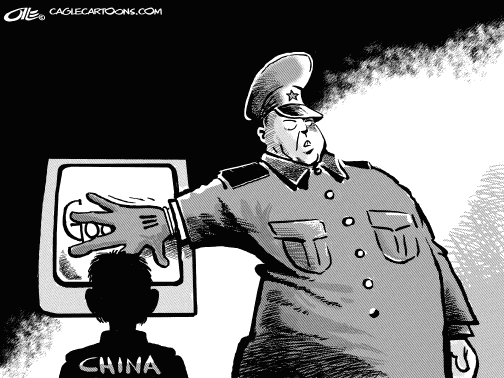As a supporter of both South-South cooperation and a more prominent role for emerging powers in international institutions, I was rather upset to confirm, during last week’s trip to Chongqing, that the Post-Western World website is blocked in China. After frequently receiving comments from Chinese readers on articles last year, all Chinese readers and commentators of articles written in Chinese in 2012 live in places other than Mainland China. Upon asking a Chinese colleague based at a university in the United States, he pointed to a series of articles on the website, namely a book review of “The Party: The Secret World of China’s Communist Rulers” by Richard McGregor – which, of course, is banned in China, and an analysis of whether the “conflict of the century” between China and India could lead to war, which, according to him, had crossed the “invisible line.”
Nobody can tell where the “invisible line” in China really is, of course – it very much depends on current political trends. As a blogger based in China wrote last year, “the much more powerful force is the invisible line that keeps the author guessing what is or isn’t “sensitive.” He adds that “this is the system that the Party prefers. With no one clear about what can be said, many opt instead to be more cautious in their writing, even if it wouldn’t have been caught by censors.”
Murong Xuecun, a novelist from China, puts it rather bluntly, calling himself a “castrated writer”, and a “proactive eunuch” who “castrates himself even before the surgeon raises his scalpel.” “I can clearly feel the impact of censorship when I write. For example, I’ll think of a sentence, and then realize that it will for sure get deleted. Then I won’t even write it down. This self-censoring is the worst.”
The consequences for those not based in China or not seeking to reach Chinese readers specifically are much less affected by the ‘invisible line’. In 2008, Harvard Professor Dani Rodrik was surprised to find out that his blog was blocked in China, yet this, of course, did not cause the self-censorship Xuecun describes.
For academics around the world seeking to engage with Chinese academics and policy analysts, however, censorship in China poses a series of practical difficulties. Sending each other links to articles, YouTube interviews or blog posts about the BRICS is possible with Indian, Brazilian, Russian and South African counterparts, but more difficult with Chinese partners, who may not be able to access them. Creating a Facebook group for young researchers from each of the BRICS countries is impossible because the Chinese government decided to block Facebook, Twitter and YouTube after the 2009 riots in the Western province of Xinjiang.
Some will say that this strengthens the argument for keeping BRICS separate from IBSA, where issues around civil society, democracy, corruption and human rights can be discussed openly. They have a point, and IBSA is too valuable to be merged with BRICS. Yet while censorship in China creates hurdles for academics and policy analysts from Brazil, India and elsewhere to work with their Chinese counterparts, China is far too important to be excluded entirely. Quite to the contrary, the practical obstacles to exchanging ideas and information require more face-to-face meetings, workshops, conferences, student exchange programs and visiting fellowships with Chinese institutions. Debating articles such as Yan Xuetong’s “How China can defeat America” are crucial for academics from around the world to gain a better understanding of China’s perspective. Aside from English, Chinese must become the second foreign language at universities – in Brazil, far too many students still learn French instead.
Today, the city of São Paulo announced that it will have 80 policemen take Chinese classes at the local Confucius Institute in order to, the Folha de São Paulo reports, “deal with irregular street vendors and help tourists”. With only 5% of Brazil’s population conversant in English, some may criticize this move, but it is a laudable, albeit small, step to prepare Brazil for China’s rise and growing global presence.
Read also:
Can Brazil learn to manipulate China?
Resenha: “O que a China quer?” Matias Spektor e Dani Nedal (Orgs.)
How immigration will change Brazil
Image credit: Caglecartoon









